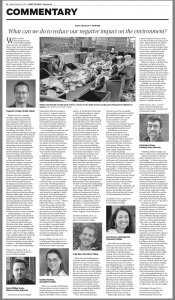 Editor’s Note: In the Feb. 17, 2019, edition of the (Worcester) Telegram & Gazette‘s “Faculty Forum,” Nichols College Professor of Environmental Science Prajjwal K. Panday, Ph.D., addresses the topic of climate change. He answered the newspaper’s question: “What can be done by the average person to reduce our negative impact on the environment, and decrease the likelihood of natural disasters, here in Central Massachusetts, and elsewhere in the world?”
Editor’s Note: In the Feb. 17, 2019, edition of the (Worcester) Telegram & Gazette‘s “Faculty Forum,” Nichols College Professor of Environmental Science Prajjwal K. Panday, Ph.D., addresses the topic of climate change. He answered the newspaper’s question: “What can be done by the average person to reduce our negative impact on the environment, and decrease the likelihood of natural disasters, here in Central Massachusetts, and elsewhere in the world?”
BY PRAJJWAL K. PANDAY, Ph.D.
Rising sea levels, extreme weather, and severe flooding are some of the impacts of climate change we experience in Massachusetts. Each of us can take several steps to shift from our dependency on fossil fuels to avoid long-term risks. We can start locally by reducing our energy and carbon footprint (switching to renewable energy, eating more of a plant-based diet, and minimizing waste), communicating with local and state representatives, and joining a local organization that focuses on the environment. However, we are running out of time without urgent and collective decisions at the federal, national, and international levels.

Nichols College Professor of Environmental Science Prajjwal Panday, Ph.D.
Massachusetts has taken bold actions and initiatives to combat climate change. Greenhouse gas emissions for the state are on course for its 2020 reduction goal, with a target of achieving 80 percent reduction by 2050. Recently unveiled legislation proposes the state transition to 100 percent renewable electricity by 2035 and 100 percent clean power for transportation and heating by 2045. Massachusetts has provided funding to several municipalities to work with residents, communities, and businesses to be proactive in reducing climate change risks. Boston, for example, has adopted a Climate Ready initiative, which focuses on several projects to protect the city neighborhoods from severe weather and sea-level increases. The total cost may exceed $1 billion, but these are the time-sensitive issues we must consider.
Despite progress, recent climate reports have indicated that mitigative actions against climate change must be more aggressive. This may take the form of the Green New Deal, supported by Massachusetts lawmakers and unveiled by U.S. Senator Ed Markey and U.S. Congresswoman Alexandria Ocasio-Cortez. This 10-year plan emphasizes a holistic approach of climate solutions focused on greening infrastructure, dramatic expansion of renewable energy, and job creation—all while promoting justice, equity, and sustainability.
Prajjwal K. Panday, Ph.D., is professor of environmental science at Nichols College in Dudley, Mass.